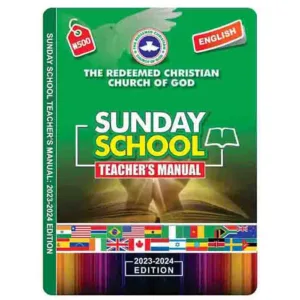This is RCCG Sunday School Teachers Manual 31 March 2024 for the adult class. Today’s Lesson 31 topic is INTENTIONAL PARENTING.
Read:
- RCCG Sunday School Students Manual 31 March 2024
- Open Heaven 31 March 2024 Devotional
- RCCG YAYA Sunday School 31 March 2024 Manual
- RCCG House Fellowship Manual 31 March 2024

RCCG SUNDAY SCHOOL TEACHERS MANUAL 31 MARCH 2024 (LESSON 31)
TOPIC: INTENTIONAL PARENTING
Note: Check RCCG SUNDAY SCHOOL HYMN LYRICS
OPENING PRAYER
Almighty Father, please help all parents to train up their children in the way of the Lord in the name of Jesus.
PREVIOUS KNOWLEDGE:
The teacher should allow the Assistant Teacher to review the previous week’s lesson.
TODAY’S LESSON
BIBLE PASSAGE: Esther 2:5-9
5 Now in Shushan the palace there was a certain Jew, whose name was Mordecai, the son of Jair, the son of Shimei, the son of Kish, a Benjamite;
6 Who had been carried away from Jerusalem with the captivity which had been carried away with Jeconiah king of Judah, whom Nebuchadnezzar the king of Babylon had carried away.
7 And he brought up Hadassah, that is, Esther, his uncle’s daughter: for she had neither father nor mother, and the maid was fair and beautiful; whom Mordecai, when her father and mother were dead, took for his own daughter.
8 So it came to pass, when the king’s commandment and his decree was heard, and when many maidens were gathered together unto Shushan the palace, to the custody of Hegai, that Esther was brought also unto the king’s house, to the custody of Hegai, keeper of the women.
9 And the maiden pleased him, and she obtained kindness of him; and he speedily gave her her things for purification, with such things as belonged to her, and seven maidens, which were meet to be given her, out of the king’s house: and he preferred her and her maids unto the best place of the house of the women.
MEMORY VERSE: Proverbs 22:6
Train up a child in the way he should go: and when he is old, he will not depart from it.
INTRODUCTION
Good parenting does not just happen. The actions we intentionally take or refuse to take and the ways we consciously parent in the midst of all of life’s challenges have a direct impact on our children.
In this lesson, we shall consider what it means to parent intentionally and some of the ways to go about it.
TEACHER’S DIARY
LESSON AIM:
To know how to parent intentionally.
TEACHING OBJECTIVES:
Through the lesson, students should be able to:
- Understand what it means to parent intentionally.
- Discover how to parent intentionally.
TEACHING PLAN:
To achieve the above-stated objectives:
a. Students should be allowed to read the Bible passage, recite the memory verse, and participate in class activities and other discussions
b. The Assistant Teacher should review the previous week’s lesson, conduct the class, and mark the attendance and the assignment
C. Tne Teacher should explain the two lesson outline, summarize, conclude, evaluate the lesson, and give an assignment.
TEXT REVIEW: Esther 2:5-9.
The teacher should answer the following questions arising from the passage above:
i. Who was Hadassah? …………………….
ii. Where were her parents? ………………….
iii. Who were the kings of Judah and Babylon during the captivity? ……………
iv. Who was Mordecai? What can you say about him ………………
v. Who was the keeper of women in Shushan? ………………
TEACHING METHOD:
A combination of Question and Answer and Lecture teaching methods.
TIME MANAGEMENT:
The teacher should share the time equally between the two lessons outline.
OUTLINES:
- INTENTIONAL PARENTING DESCRIBED
- WAYS TO BE INTENTIONAL
1. INTENTIONAL PARENTING DESCRIBED
A. The teacher should test the knowledge of the students on the topic by asking them to explain what intentional parenting means.
B. The teacher should define the meaning of intentional parenting as follows:
i. Parenting with a goal (Habakkuk 2:2).
ii. Ability to think through every step of your child’s stage of development. (1 Samuel 1:11).
iii. It is making informed and conscious parenting choices concerning the child. (Genesis 24:3-4; 1 Samuel 1:24).
C. The teacher should explain to the students that intentional parenting focuses on:
i. What parents can do to help their children succeed. (2 Timothy. 1:5; Proverbs 13:22a).
ji. The specific actions parents should take to support their children’s strengths and weaknesses. (Exodus 18:15-24, Ruth 3:1-5).
iii. Parents’ activities to facilitate the development of their children to achieve their desired or acceptable results. (2 Timothy 3:14-15)
D. The teacher should ask the students to mention the goals or Intentional parenting as indicated below:
i. To help children walk in the footsteps of godly parents. (1 Corinthians 11:1).
ii. It is not permissive parenting; it involves giving up control to God while we intentionally do our part as parents (Genesis 18:19, Joshua 24.15)
iii. It also means parents understand themselves, their values, their motivations, strengths and weaknesses.
iv. Intentional parenting begins with the parents and not with the child. It cannot be outsourced.
CLASS ACTIVITY 1:
What are the goals and focus of intentional parenting?
2. WAYS TO BE INTENTIONAL
i. Believe that God has given you the power to influence your child positively. (Philippians 4:13).
ii. Get the right knowledge: through the word of God, counselling, reading of books on parenting, attending trainings/seminars, etc. (Proverbs 4:7).
iii. Know that childhood is neither a race nor a competition. There is no basis for comparison. ( Corinthians 10:12).
iv. Give them appropriate responsibilities according to their age. (Genesis 37:13-14, 1 Samuel 17:17-18)
v. Teach them essential life skills. (Proverbs 31:1-9)
vi. Deliberately teach them the word of God. (Deuteronomy 6:6-7; 2 Timothy 3:15).
vii. Accept your child’s uniqueness. (Psalm 139:14).
viii. Be a great role model. (Titus 2:7).
ix. Be consistent, persistent, and deliberate with discipline. (Proverbs 29:15, Hebrews 12:7).
x. Communicate values clearly to your children. Do not parent on assumption. (Psalm 78:2-4).
xi. Be an emotionally intelligent parent. (Colossians 3:21).
xii. Work on yourself as a parent. (Matthew 1:3-5).
CLASS ACTIVITY 2:
Discuss the ways to be intentional in raising a child who is showing traces of disobedience.
CONCLUSION: RCCG Sunday School Teachers Manual 31 March 2024
Parenting with intentionality will bring you and your child greater happiness (Proverbs 29:17). Start early.
QUESTION
- Describe intentional parenting in three sentences
- Mention four things parents can do to be intentional in raising a child.
EVALUATION:
Describe the meaning and activities of intentional parenting.
CLOSING PRAYER:
Oh God, please do not let me be guilty over my children’s upbringing. Let my children succeed in life in the name of Jesus.
ASSIGNMENT: RCCG Sunday School Teachers Manual 31 March 2024
Mention any five (5) Bible characters that were intentionally parented with Bible reference. (2X5=10 Marks).
Follow RCCG Live on:




